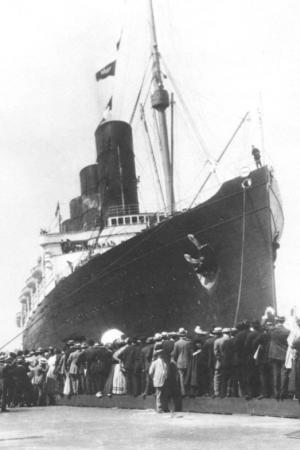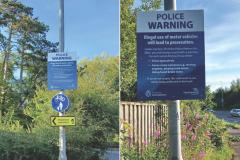
Stalemate continued in the Dardanelles and on the Western Front. There were, however, fresh developments in May – submarine attacks in the Atlantic on ships flying a neutral flag, new allies, new offences and a new government.
The attack, without warning, by U2O on the British owned Cunard ocean liner RMS Lusitania en route to Liverpool from New York began a campaign that would ultimately cost the Germans dearly. Sinking in about 18 minutes, the vessel went down about 11 miles off the Old Head of Kinsdale, Ireland, killing 1,198 (including 128 Americans) and leaving only 761 survivors. A propaganda war and diplomatic protests ensued. She had been warned not to sail and was undoubtedly carrying cartridges and shell casings, but only civilian passengers. Rescue ships arrived late and many died of drowning and hypothermia. Demonstrations and riots erupted around the world. Woodrow Wilson, however, did not clamour for war and indeed ran on a "peace ticket" in the presidential election of 1916. US public opinion shifted but it would take another 2 years and an "unrestricted" U boat campaign to bring the USA into the conflict on 2nd April 1917.
The Allies did acquire a new ally this month when Italy declared war on Austria-Hungary on 23rd May. Ignoring previous agreements with the Central Powers, they launched an attack on their common border on a 400 mile front especially along the passes at Trentino and Isonzo river – the focus of all military activity until the end of the war.
The 2nd battle of Ypres wore on and we recovered Hill 60 on 6th May. Sadly our locality was to lose another casualty on this day just further south. As his family grave in Wilmslow Cemetery records, Private Albert Birtles (service number 1603) 5th battalion Cheshires "beloved son of Job and Fanny Birtles was killed in France, May 6 1915 aged 26". A consoling letter to his mother from 2nd Lieutenant Thomas L C Heals published in the Wilmslow and Alderley Advertiser on 21st May said "... He was struck by a bullet in the head and death was instantaneous. He suffered no pain at all. He was always cheery no matter what ... His company commander joins me in expressing our deepest sympathy ..." (His brother Stanley was to die on 26th May 1918.) Albert was a bleach worker and in 1911 is recorded as living in Manchester Road, with his parents (coal merchants), 2 sisters and 2 brothers. His other 5 siblings had left home by then. His name is on the civic memorial and in St Bart's and he is buried at Spoilbank Cemetery, Ypres.
Our second loss was Private Frank Shuttleworth, who is recorded on Wilmslow memorial and in 2 churches – the United Reformed and St Bartholomew's. His father, Samuel, was a caretaker in the Congregational School just behind where King's Court is now on Water Lane. Frank was one of 7 children and lived adjacent to the school. He was a market gardener for Cheshire at Holmes Chapel Council before moving to North Mimms, Hertfordshire to work in a stately home. He volunteered for the London Regiment (service number 2656) and as he was reported "missing" his mother, Emily used the Red Cross to try and trace him as a PoW. However, an eyewitness, William Stenning (wounded on 26th May 1915), then in hospital in Cambridgeshire said that her son tragically was shot through the head near him and died quickly after. He is commemorated at Le Touret, Armentieres nearby.
The actions in which these 2 local men were involved – Ypres, Aubers Ridge and Festubert – had political ramifications. British artillery equipment and shells were often poor – many "duds" were reported. This "shell crisis" plus failures of the offences in Gallipoli (see below) caused a Liberal Cabinet split and Prime Minister Herbert H Asquith was forced to form a coalition government by shoring up his team with Conservatives on 25th May. His personal life also became troubled. He was a visitor to Alderley Edge as he had met the local Baron's youngest daughter, Venetia Stanley, in Sicily in 1910 and begun an "epistolary obsession". He wrote her over 560 letters and by 1915 was writing up to 3 a day often during cabinet meetings with requests for advice on political and military strategy! Overwhelmed by the Prime Minister's obsession she accepted a marriage proposal from his protégé Edwin S Montague, a Liberal MP, and informed Asquith on 12th May of her decision. Within days of this rejection, he apparently started an intense relationship with her older sister, Sylvia, although it is not known how far the relationship went.
The bloody landings at Gallipoli were perhaps some of the greatest British military tragedies of the twentieth century. Early on 25th April 15,000 Australians and New Zealanders stormed ashore – an occasion for ever to be remembered as ANZAC Day. The "Blackadder /Oh What a Lovely War" school of thought regarding all British generals as fools and knaves is largely incorrect. However, some of those who presided over this campaign were allegedly amongst the most hopeless, indecisive, insensitive blunderers ever to lead our armed forces. The Turks, on the other hand, having priceless time to prepare defences, fought with heroic determination led in a masterly fashion by von Sanders and Mustafa Kemal.
What of our local lads? The 6,000 strong Manchester Infantry Brigade (5th, 6th, 7th and 8th battalions) containing many local men were ably led by Noel Lee, the first Territorial to be promoted to Brigadier General. (He died in Malta on 22nd June from wounds received on 4th June and is commemorated on Styal memorial, in St Bart's and on the civic memorial.) Attached to the 42nd East Lancashire Division, they went ashore at Cape Helles on 6th May alongside the Lancashire Fusiliers who were famously to win "6 VCs before breakfast" on "W" beach. Checked and confined to a narrow beachhead beneath cliffs and under artillery and sniper fire, they suffered terribly. Pinned down for the next 8 months, we held no secure rear, just exposed beaches and sea. A pattern was set by both sides. Costly attacks, including that of the 4th and 7th Cheshires in August, were followed by equally ruinous counter-attacks. Pitiless heat, diarrhoea, typhus and dysentery took their toll. The flies and stench were appalling. Overall 14 local men were to perish here - 8 are remembered on the Helles memorial near where the Manchesters landed.
Guest post by Jon Armstrong and Alan Cooper, Wilmslow Historical Society, with a contribution from Adrian Lennard.
Photo: Lusitania arriving in New York.









Comments
Here's what readers have had to say so far. Why not add your thoughts below.
see http://bit.ly/1KHlasT